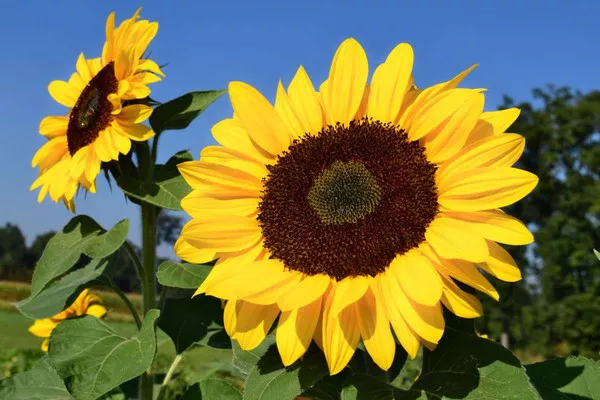Sunflower seeds, often consumed as a nutritious snack or incorporated into various culinary creations, originate from the sunflower plant (Helianthus annuus). These seeds are encased within the large, round seed heads that develop atop sturdy stalks. Sunflower seeds are rich in essential nutrients such as healthy fats, protein, fiber, vitamins, and minerals, making them a popular choice for health-conscious individuals.
The Viability of Planting Consumable Sunflower Seeds
The question of whether sunflower seeds meant for consumption can be successfully planted is a common inquiry among gardening enthusiasts. The answer largely depends on the type of sunflower seeds available and their processing methods.
Raw Sunflower Seeds:
Raw sunflower seeds, typically sold in health food stores or bulk bins, are minimally processed and have not been roasted, salted, or flavored. These seeds have the highest likelihood of germination when planted, as they have not undergone any treatments that could potentially hinder their ability to sprout.
Planting raw sunflower seeds is generally viable, provided they are of good quality and have not been subjected to harsh conditions that might affect their viability. When selecting raw sunflower seeds for planting, it’s essential to choose those that appear plump, healthy, and free from damage or signs of mold.
Roasted or Flavored Sunflower Seeds:
Roasted or flavored sunflower seeds, commonly found in grocery stores and convenience stores, undergo processing that may diminish their ability to germinate successfully. Roasting involves exposing the seeds to high temperatures, which can alter their internal structure and viability for sprouting.
Similarly, flavored sunflower seeds may contain additives such as salt, spices, or oils, which could inhibit germination or affect the health of emerging seedlings. While it is possible for some roasted or flavored sunflower seeds to germinate under optimal conditions, the success rate may be lower compared to planting raw seeds.
Factors Affecting Germination
Several factors influence the germination success of sunflower seeds, regardless of whether they are intended for consumption or planting:
1. Seed Quality: High-quality seeds sourced from reputable suppliers are more likely to germinate successfully.
Soil Conditions: Well-draining soil with adequate moisture and nutrient levels is essential for optimal seedling development.
2. Temperature: Sunflowers thrive in warm temperatures, with soil temperatures of around 70°F (21°C) being ideal for germination.
3. Watering: Consistent watering is crucial during the germination and early growth stages to ensure proper hydration of the seeds and seedlings.
4. Sunlight: Sunflowers are sun-loving plants that require ample sunlight for healthy growth and development.
By optimizing these factors, gardeners can increase the likelihood of successful germination and cultivate robust sunflower plants from both raw and processed seeds.
Planting Consumable Sunflower Seeds
For those interested in planting sunflower seeds typically consumed as snacks, here’s a step-by-step guide to get started:
1. Seed Selection: Choose high-quality, raw sunflower seeds free from damage or signs of spoilage.
2. Site Preparation: Select a sunny location with well-draining soil. Prepare the soil by loosening it to a depth of 6-8 inches (15-20 cm) and incorporating organic matter if needed.
3. Planting: Plant the sunflower seeds directly into the soil at a depth of 1-2 inches (2.5-5 cm), spacing them 6-12 inches (15-30 cm) apart, depending on the variety.
4. Watering: Keep the soil consistently moist but not waterlogged. Water the seeds immediately after planting and continue to water regularly, especially during dry periods.
5. Thinning: Once the seedlings emerge and develop their first set of true leaves, thin them to allow for proper spacing and optimal growth.
6. Maintenance: Monitor the plants for pests and diseases, and provide support if growing tall varieties prone to lodging.
7. Harvesting: Allow the sunflowers to mature fully on the plant before harvesting the seeds. Harvest the seed heads once the back of the flower heads turn brown, and the seeds feel firm and plump.
By following these steps and providing proper care, gardeners can cultivate sunflowers from seeds typically consumed as snacks, enjoying both the beauty of the plants and the satisfaction of growing their own nutritious snacks.
Conclusion
Planting sunflower seeds intended for consumption can indeed yield flourishing sunflower plants under the right conditions. While raw sunflower seeds are the most suitable for germination, some roasted or flavored seeds may also sprout, albeit with potentially lower success rates. By considering factors such as seed quality, soil conditions, and proper care, gardeners can successfully grow sunflowers from seeds typically enjoyed as snacks, adding a touch of beauty and utility to their garden landscapes. So go ahead, plant those sunflower seeds, and watch nature’s marvel unfold before your eyes.


